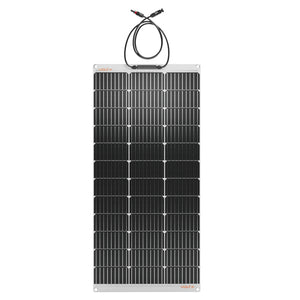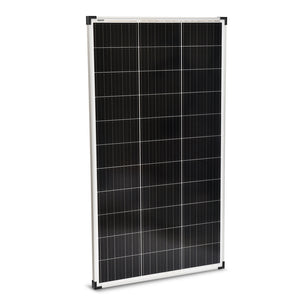Vehicle solar panels are ideal for anyone who is travelling long distances in their van, 4WD, or car. When you 're travelling far between stops, these can be used to keep your batteries charged, and you don 't need to be concerned about stopping to get your solar power systems set up and ready to go. Additionally, it means that you can use your batteries as you drive to charge your phones, laptop, drones, or anything that has an internal lithium battery.
Making use of free energy from the sun is the easiest and most environmentally friendly way to produce electricity while you 're away from a mains power connection. With a solar panel system attached to your vehicle, it allows you to stay off the grid and still get power while exploring remote locations.
If you need some assistance in choosing the right vehicle solar panels for your needs, then you can call one of our team members or send us an email. Our offices are staffed from Monday to Friday (9am - 5pm), and during that time, our team members will be more than willing to assist you and provide information. All orders placed through the Outbax online store will be processed in under 24 hours, and with shipping only taking 3-7 days (depending on the couriers), your items will arrive quickly at your chosen destination. When submitting your order, we highly recommend adding postal insurance to protect you against any potential damages caused during transit. All products are tested by our staff to make sure they are suitable for use in tough Australian conditions.
How does a vehicle solar panel work?
Generally, vehicle solar panels will convert light from the sun (which is composed of particles of energy called "photons") to create the electricity to recharge your battery. The exact amount of energy you collect will rely on the wattage rating of your solar panels and the number of hours of sunlight they get. For example, a 250 watt solar panel will generate about 1750 watts of power during a seven-hour period.
Vehicle solar panels can be attached to your vehicle in two ways: they could be mounted on a set of roof racks (in the case of glass solar panels), or fastened using high-quality double sided tape (in the case of flexible solar panels). They work in much the same way that solar panels work on a residential property, except they will not save electricity in a grid network. Instead, you 'll need to store the electricity in a suitable lithium battery. At Outbax, the 100Ah, or 200Ah batteries are the most popular, however, if space is limited, you can choose from our slimline lithium batteries.
What are the benefits of a vehicle solar panel?
>Vehicle solar panels are perfect for recharging your batteries as you drive. By using these, you will be able to save money on fuel while saving the planet. You 'll also save time since they are already in position and you don 't need to worry about where to place them. When you have solar panels attached to your vehicle, it limits the number of times that you need to move them and this can lower the possibilities of them getting damaged. Since they are mounted on your vehicle, it means that moving them around will never be a problem. As they are always up and running, you can use the lithium battery in your car as you drive. There are products that come with multiple USB ports so you can directly charge your gadgets.
One of the newest trends in travel is going on the road with a kitted out van. These mobile homes are increasing in popularity, and if you want to avoid the high costs associated with staying in a caravan park, then you can make use of the free real estate on the top of your van.
If you 're looking for a streamlined look, then you can choose flexible solar panels as these will conform to the curve of the roof of your vehicle. Alternatively, you can use fixed solar panels, but they may need some additional mounting parts. Usually, a sturdy set of roof racks is all that is required.
You 'll find that solar panels come in a variety of sizes and capabilities. To determine which wattage is best suited for your needs, this will depend on your power consumption during the day. This can be worked out quite easily by checking all the appliances that you 're planning on running and taking note of how much power they will consume in an hour. Most electrical items are marked in either watts or amp hours (Ah). Consider how long you 'll use each appliance and add up all the watts or amp hours they will be using. For the best results, it 's highly recommended that you put in an additional 25 percent. This will give you a good buffer amount for times when you require a little more electricity, or when the vehicle solar panels may not be operating at peak efficiency (e.g. when it is cloudy or raining). As a backup to most solar panel systems, it can be good to have a small portable generator on hand to recharge your batteries if needed.



